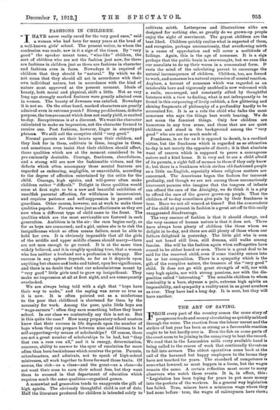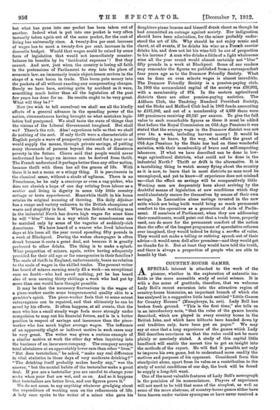THE ART OF SAVING.
FROM every part of the country cornea the same story of prosperous trade and money circulating as quickly as blood through the veins. The reaction from the labour unrest and the strikes of last year has been as strong as a favourable reaction ought to be but hardly ever is. Even the fish on some parts of the coast seem to be joining in the conspiracy to beat the record. We read that in the Lancashire mills every available hand is being called to the rescue of work that continually threatens to fall into arrears. The oldest operatives come back at the call of the harassed but happy employers to the looms they have not touched for years. The standard of competence is somewhat lowered, as must happen in a boom, but the wages remain the same. A certain reflection must occur to many observers who watch these events. It is, in effect, this : "Legislation has been trying for years to put more money into the pockets of the workers. In a general way legislation has failed. True, miners have a minimum wage where they had none before • true, the wages of railwaymen have risen; but what has gone into one pocket has been taken out of another. Indeed what is put into one pocket is very often instantly taken again out of the same pocket, for the cost of living has universally risen. A twenty-five per cent. increase of wages has to meet a twenty-five per cent, increase in the domestic budget. Would that wages could be raised by some form of legislation that would not immediately counter- balance its benefits by its 'incidental expenses ' ! But they cannot. And now, just when the country is losing all faith in the pretensions of Parliament to step into the place of economic law, an immensely ironic object-lesson arrives in the shape of a vast boom in trade. This boom puts money into the pockets of all without exacting any compensating charges. Surely we have here, arriving quite by accident as it were, something much better than all the legislation of the past few years has done for us. Its results ought to be very great. What will they be ?"
Now (we wish to tell ourselves) we shall see all the kindly effects of a general advance in the spending power of the nation, circumstances having brought UB what mistaken legis- lation had postponed. We shall taste the state of things that the visions of the Liberal Government imagined. But shall we There's the rub. Alas! experience tells us that we shall do nothing of the sort. If only thrift were a characteristic of English people a wave of prosperity continued for a year or so would supply the means, through private savings, of putting many thousands of persons beyond the reach of disastrous poverty in the future. Cicero said that people would never understand how large an income can be derived from thrift. The French understand it perhaps better than any other nation, because thrift with them has all the graces of life. With them it is not a mean or a stingy thing. It is parcimonia in the classical sense, without a shade of ugliness. There is no Frenchman, be he only a concierge or even a rag-picker, who does not cherish a hope of one day retiring from labour as a rentier and living in dignity in some tidy little country cottage or town appartement. Meanwhile thrift in his home retains its original meaning of thriving. His daily d4eliner has a range and variety unknown to the British champions of waste and stupidity in food. When the British working man in the industrial North has drawn high wages for some time he will " blue " them in a way which for senselessness can be matched only by some of the vagaries of suddenly-rich Americans. We have heard of a weaver who lived laborious days at his loom all the year round spending fifty pounds in a week at Blackpool. During the wakes champagne is often drunk because it costs a great deal, not because it is greatly preferred to other drinks. The thing is to make a splash. What proportion of miners, again, retire having adequately provided for their old age or for emergencies in their families? The scale of thrift in England, unfortunately, bears no relation to the scale of wages in the skilled trades. The present writer has heard of miners earning nearly 25 a week—an exceptional case no doubt—who had saved nothing, yet he has heard also of men earning thirty shillings a week who had put by more than one would have thought possible.
It may be that the necessary fluctuations in the wages of a piece-worker excite some temperamental quality akin to a gambler's spirit. The piece-worker feels that to some extent extravagance can be repaired, and that ultimately he can be saved by his efforts. It often happens, at all events, that the man who has a small steady wage feels more strongly under compulsion to map out his financial future, and is in a better position in respect of savings and insurance than the piece- worker who has much higher average wages. The influence of an apparently slight or indirect motive in such cases may be very great. The writer was given a curious example of a similar motive at work the other day when inquiring into the business of an insurance company. The company accepts total abstainers at an appreciably lower rate than other" lives." "But does teetotalism," he asked, "make any real difference in vital statistics in these days of very moderate drinking?" "The drinking itself probably makes hardly any," was the answer, "but the mental habits of the teetotaller make a great deal. If you are a teetotaller you are careful to change your socks when your feet are wet, and so on. And so it happens that teetotallers are better lives, and our figures prove it."
We do not mean to say anything whatever grudging about the expenditure of working men on the refinements of life. A lady once spoke to the writer of a miner who gave his daughters piano lessons and himself drank claret as though he had committed an outrage against society. Her indignation should have been admiration, for the miner probably under- stood the art of life. Why should he not enjoy music and claret, at all events, if he drinks his wine as a French ouvrier drinks his, and does not let his wine-bill be out of proportion to his income? A man who drinks a little of a light wholesome wine all the year round would almost certainly not "blue" fifty pounds in a week at Blackpool. Some of our readers may remember the figures we published from a correspondent four years ago as to the Dunmow Friendly Society. What can be done on even minute wages is almost incredible. The Dunmow Friendly Society is a pension-paying club. In 1908 the accumulated capital of the society was 238,992, with a membership of 974. In the eastern agricultural districts there are other pension-paying societies. The .Aldham Club, the Tendring Hundred Provident Society, and the Stoke and Melford Club bad in 1908 funds amounting to 2181,000, and out of a membership of 4,689 there were 580 pensioners receiving 26,247 per annum. To give the full value to such remarkable figures as these it must be added that before the Royal Commission on Old-Age Pensions it was stated that the average wage in the Dunmow district was not over 14s. a week, including harvest money! It would be interesting to know, by the way, what effect the grant of Old-Age Pensions by the State has had on these wonderful societies, with their membership of brave and self-respecting labourers. If what we have described can be done in low- wage agricultural districts, what could not be done in the industrial North P Thrift or drift is the alternative. It is a tantalizing thing to watch money flying about the country as it is now, to learn that in most districts no man need be unemployed, and yet to know—if experience does not mislead us—that the effect on savings will be comparatively little Working men are desperately keen about arriving by the doubtful means of legislation at new conditions which they could absolutely ensure for themselves by means of their own savings. In Lancashire alone savings invested in the new mills which are being built would bring as much permanent comfort to the operatives as a generation of Acts of Parlia- ment. If members of Parliament, when they are addressing their constituents, would point out that a trade boom, properly used, can do more for the permanent comfort of the nation than the offer of the longest programme of speculative reforms ever imagined, they would indeed be doing a service of value. They would not make a telling or enticing speech out of their advice—it would seem dull after promises—and they would get no thanks for it. But at least they would have told the truth, and there is always a proportion of people who are able to benefit by that.







































































 Previous page
Previous page